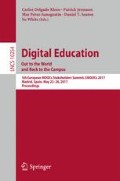Abstract
Nowadays, the digital transformation is affecting any task, activity, process that is done in any organization or even in our daily life activities. The education sector, considered as one of the leading sectors in terms of innovation through technology, is also facing a transformation in which digital technology is rapidly evolving. In this context, the Massive Open Online Courses (MOOC) phenomenon has gained a lot of attraction due to the capability of reaching thousands or even millions of students from all over the world. However, the activities related to MOOCs are not yet being evaluated or quantified as a driver of change. Since the creation of MOOCs requires support and institutional commitment to deliver high-quality courses on technology-based platforms, it seems reasonable to measure the degree of innovation in education through the definition of an indicator that collects the commitment of an institution or a person to this new environment of digital education. That is why, in this paper, authors present the definition of a novel indicator and several potential metrics to represent and quantify the degree of innovation in education in universities. Furthermore, a case study is conducted to evaluate 3 different metrics on 36 European universities in the context of the edX and Coursera platforms.
Access this chapter
Tax calculation will be finalised at checkout
Purchases are for personal use only
Notes
- 1.
- 2.
- 3.
- 4.
- 5.
- 6.
References
Billaut, J.-C., Bouyssou, D., Vincke, P.: Should you believe in the Shanghai ranking? Scientometrics 84(1), 237–263 (2010)
Docampo, D.: Reproducibility of the Shanghai academic ranking of world universities results. Scientometrics 94(2), 567–587 (2013)
OECD: Measuring Innovation in Education. OECD Publishing, Paris (2014)
Christensen, G., Steinmetz, A., Alcorn, B., Bennett, A., Woods, D., Emanuel, E.J.: The MOOC phenomenon: who takes massive open online courses and why? SSRN Electron. J., 1–25 (2013). https://papers.ssrn.com/sol3/papers.cfm?abstract_id=2350964
Leony, D., Muñoz-Merino, P.J., Ruipérez-Valiente, J.A., Pardo, A., Kloos, C.D.: Detection and evaluation of emotions in massive open online courses. J-JUCS 21(5), 638–655 (2015)
Rizzardini, R.H., García-Peñalvo, F.J., Kloos, C.D.: Massive open online courses: combining methodologies and architecture for a success learning. J-JUCS 21(5), 636–637 (2015)
de Amescua, A., Alvarez-Rodríguez, J.M., Sanchez-Segura, M.-I., Medina-Domínguez, F.: An agile framework definition for creating an engineering massive open online course from scratch A case study. Int. J. Eng. Educ. 35(5(B)), 2360–2373 (2016)
Alvarez-Rodŕiguez, J.M., Clement, J., Gayo, J.E.L., Farhan, H., Ordoñez De Pablos, P.: Publishing statistical data following the linked open data principles: the web index project. In: Cases on Open-Linked Data and Semantic Web Applications, pp. 199–226. IGI Global (2013)
Downes, S.: The quality of massive open online courses. In: Khan, B.H., Ally, M. (eds.) International Handbook of E-Learning. Theoretical Perspective, vol. 1. Routledg, 22 March 2015
Clark, D.: MOOCs: taxonomy of 8 types of MOOC (2013)
Conole, G.: MOOCs as disruptive technologies: strategies for enhancing the learner experience and quality of MOOCs. RED Rev. Educ. Distancia 39, 1–17 (2013)
Guàrdia, L., Maina, M., Sangrà, A.: MOOC design principles: a pedagogical approach from the learner’s perspective. ELearning Pap. 33, 1–6 (2013)
Mackness, J., Waite, M., Roberts, G., Lovegrove, E.: Learning in a small, task–oriented, connectivist MOOC: pedagogical issues and implications for higher education. Int. Rev. Res. Open Distrib. Learn. 14(4), 140–159 (2013)
McAndrew, P.: Learning from open design: running a learning design MOOC. ELearning Pap. 33, 1–4 (2013)
Scott, I., Kendra, L., Woodgate, A.: How to Grow Your Own MOOC with Coursera. University of Edinburgh, Edinburgh (2014)
Kerr, J.: Building and Executing MOOCs. University of Glasgow, Glasgow (2015)
Alario-Hoyos, C., Pérez-Sanagustín, M., Cormier, D., Kloos, C.D.: Proposal for a conceptual framework for educators to describe and design MOOCs. J-JUCS 20(1), 6–23 (2014)
Alario-Hoyos, C., Pérez-Sanagustín, M., Kloos, C.D., Muñoz-Merino, P.J.: Recommendations for the design and deployment of MOOCs: insights about the MOOC digital education of the future deployed in MiríadaX, pp. 403–408 (2014)
Author information
Authors and Affiliations
Corresponding author
Editor information
Editors and Affiliations
Rights and permissions
Copyright information
© 2017 Springer International Publishing AG
About this paper
Cite this paper
Alvarez-Rodríguez, J.M., de Amescua, A., García-Guzman, J., Sánchez-Segura, M. (2017). Measuring the Degree of Innovation in Education Through the Implementation of an Indicator Based on Analyzing MOOC-Related Activities. In: Delgado Kloos, C., Jermann, P., Pérez-Sanagustín, M., Seaton, D., White, S. (eds) Digital Education: Out to the World and Back to the Campus. EMOOCs 2017. Lecture Notes in Computer Science(), vol 10254. Springer, Cham. https://doi.org/10.1007/978-3-319-59044-8_14
Download citation
DOI: https://doi.org/10.1007/978-3-319-59044-8_14
Published:
Publisher Name: Springer, Cham
Print ISBN: 978-3-319-59043-1
Online ISBN: 978-3-319-59044-8
eBook Packages: Computer ScienceComputer Science (R0)

